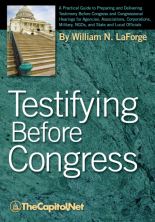From the Congressional Glossary – Including Legislative and Budget Terms
Lobby / Lobbying

A group seeking to influence the passage or defeat of legislation. Originally the term referred to persons frequenting the lobbies or corridors of legislative chambers to speak to lawmakers.
The definition of a lobby and the activity of lobbying is a matter of differing interpretation. By some definitions, lobbying is limited to direct attempts to influence lawmakers through personal interviews and persuasion. Under other definitions, lobbying attempts at indirect, or “grass-roots”, influence, such as persuading members of a group to write or visit their districts’ representative and states’ senators or attempting to create a climate of opinion favorable to a desired legislative goal.
The right to attempt to influence legislation is based on the First Amendment to the Constitution, which says Congress shall make no law abridging the right of the people to “petition the government for redress of grievances.”
Interest groups and lobbying
The usage of the term “lobbying” to pertain to persuading public officials can be traced back to 1820, two years before Ulysses S. Grant was even born (April 27, 1822). The evolution of the term “lobbying” by members of Congress themselves is implied as early as 1808 on the House floor (see §§ 1.6 and 1.8). Also, there is evidence of the terms “lobbying” or “lobbyists” being used to pertain to persuading public officials before Grant became president in 1869. Therefore, the term could not have been first coined in the Willard Hotel lobby.
§ 1.5 A Brief History: The Origin and Development of the Term “Lobbyist”, in Lobbying and Advocacy.
Also see
- K Street / Gucci Gulch (CongressionalGlossary.com)
- Lobbying and Advocacy
- § Chapter 3. Pressures on Congress: Lobbying and Congressional Ethics, in Congressional Deskbook
More
- How To Contact Congress
- Crony Capitalism / Rent-Seeking / Corporate Welfare / Revolving Door (CongressionalGlossary.com)
- Congressional Ethics (CongressionalGlossary.com)
- “Lobbying Regulations on Non-Profit Organizations,” CRS Report 96-809 (19-page PDF
 )
) - “Lobbying Reform: Background and Legislative Proposals, 109th Congress,” CRS Report RL33065 (47-page PDF
 )
) - “Lobbying Disclosure and Ethics Proposals Related to Lobbying Introduced in the 109th Congress: A Comparative Analysis,” CRS Report RL33234 (35-page PDF
 )
) - “Lobbying Congress: An Overview of Legal Provisions and Congressional Ethics Rules,” CRS Report RL31126 (44-page PDF
 )
) - “Interest Groups and Lobbyists: Sources of Information,” CRS Report RS20725 (8-page PDF
 )
) - “Post Employment, ‘Revolving Door,’ Restrictions for Legislative Branch Members and Employees,” CRS Report 95-52 (6-page PDF
 )
) - “Post-Employment, ‘Revolving Door,’ Laws for Federal Personnel,” CRS Report 97-875 (19-page PDF
 )
) - “Lobbying Registration and Disclosure: The Role of the Clerk of the House and the Secretary of the Senate,” CRS Report RL34377 (17-page PDF
 )
) - “Lobbying Congress with Appropriated Funds: Restrictions on Federal Agencies and Officials,” CRS Report R44154 (15-page PDF
 )
) - “Lobbying the Executive Branch: Current Practices and Options for Change,” CRS Report R40947 (22-page PDF
 )
)
Courses
- Congressional Operations Briefing – Capitol Hill Workshop
- Drafting Federal Legislation and Amendments
- Writing for Government and Business: Critical Thinking and Writing
- Custom Training
- Preparing and Delivering Congressional Testimony and Oral Presentations, a Five-Course series on CD
- Congress, the Legislative Process, and the Fundamentals of Lawmaking Series, a Nine-Course series on CD
Publications

Testifying Before Congress

Pocket Constitution

Citizen’s Handbook to Influencing Elected Officials: A Guide for Citizen Lobbyists and Grassroots Advocates

Congressional Procedure
CongressionalGlossary.com, from TheCapitol.Net
For more than 40 years, TheCapitol.Net and its predecessor, Congressional Quarterly Executive Conferences, have been teaching professionals from government, military, business, and NGOs about the dynamics and operations of the legislative and executive branches and how to work with them.
Our custom on-site and online training, publications, and audio courses include congressional operations, legislative and budget process, communication and advocacy, media and public relations, testifying before Congress, research skills, legislative drafting, critical thinking and writing, and more.
TheCapitol.Net is on the GSA Schedule, MAS, for custom on-site and online training. GSA Contract GS02F0192X
TheCapitol.Net is now owned by the Sunwater Institute.
Teaching how Washington and Congress work ™

